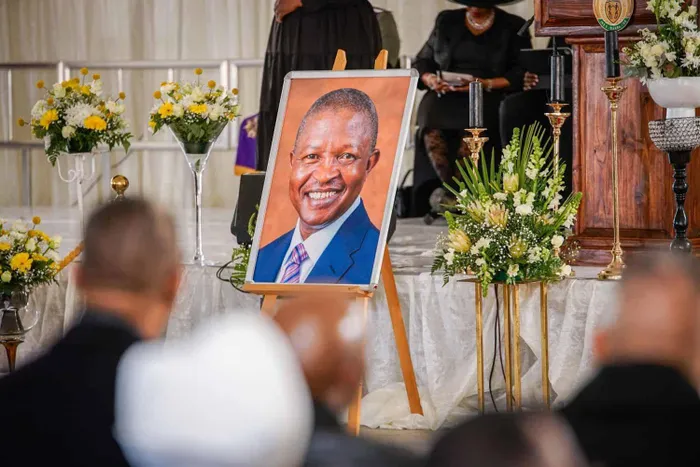Why funerals should remain family affairs, not political stages

The funeral of former deputy president David Mabuza was held at Hoërskool Bergvlam in Mbombela on Saturday.
Image: GCIS
The passing of former Deputy President David Mabuza presented South Africa with a solemn opportunity to reflect on the life and legacy of a man who served the nation in various capacities, from Premier of Mpumalanga to Deputy President of the Republic.
Yet, as has become disturbingly common in our country, what should have been a moment of unity and mourning quickly turned into a stage for political posturing and veiled jabs cloaked in memorial tributes.
This is not a new trend. In fact, the politicization of funerals and memorial services has become routine, particularly when the deceased is a prominent political figure or struggle veteran. Whether it was the funeral of Winnie Madikizela-Mandela, the memorial of Jackson Mthembu, or even the final send-off of Zulu King Goodwill Zwelithini, many of these events have veered off into political theatre, with the bereaved families often sidelined in the process. Let us be clear: funerals are sacred.
They are deeply personal, spiritual, and cultural spaces where families gather to mourn, to honour, and to begin the difficult process of healing. They are not political rallies. They are not campaign events. They are certainly not battlegrounds for factionalism. Yet, time and time again, we see public figures hijacking these occasions to make political statements, settle scores, and position themselves in the eyes of the media and the public.
At Mabuza's funeral, while some tributes were sincere and reflective, others quickly turned into political narratives — about what he was not allowed to complete, or how he was treated in his final years by his political allies. These comments may have had merit in another setting, but a funeral was not the appropriate venue for them. One must ask: what does it say about us as a nation when we cannot set aside our political ambitions for even a day, to honour the dead with dignity? The family of the deceased often becomes the unintended victims in all of this.
While dealing with unimaginable grief, they are forced to share space - and sometimes the entire narrative — with politicians who are more focused on the headlines they will make than the person who has passed. Their grief becomes sidelined in favour of grandstanding. This is not to suggest that political figures should not speak at the funerals of their comrades. On the contrary, many of these individuals have shared decades of struggle, camaraderie, and sacrifice. Their voices are valuable, even necessary. But the tone, intent, and content of those tributes must be respectful, non-partisan, and focused on the deceased, not on the politics of the day. We observed this imbalance at the funeral of ANC stalwart Jessie Duarte, where certain speeches devolved into critiques of the party's internal dynamics.
Even at the memorial of struggle icon Andrew Mlangeni, what should have been a celebration of a remarkable life was overshadowed by undercurrents of political messaging aimed at rivals within the ruling party. These events speak to a broader issue within our political culture — a culture in which no space is off-limits to political messaging. Not even a funeral. This is not unique to the ANC or the governing party, although they are the most visible. Across the political spectrum, we see a failure to understand the sanctity of these moments and the emotional needs of the families involved. We need a national conversation about the dignity of funerals and how we approach them, particularly for public figures. One suggestion could be the creation of standard protocols — led by families, with input from government and religious leaders — to ensure that these events centre on the person being laid to rest, not those left behind jockeying for political space.
Furthermore, we should encourage political parties and movements to hold separate political memorials for public tributes and reflections, allowing funerals to remain intimate, family-led affairs. Let the politics be discussed where it belongs — in conferences, in parliament, in the media — not at the graveside. The culture of grandstanding at funerals does a disservice not only to the families but to the legacies of those who have passed. When a life is reduced to a backdrop for political drama, we risk forgetting the very person we came to honour. Let Mabuza’s funeral be a wake-up call. Let us recommit to restoring dignity and respect to these final rites. Let us learn to put humanity before politics, even if just for a day. After all, in death, we all deserve peace - and so do our families.
Related Topics: